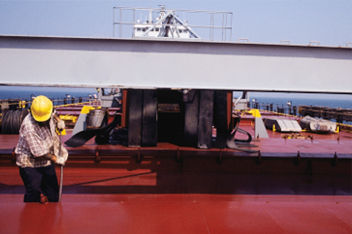


If you have been injured while working at sea, you have options. By law, all employers are required to provide their employees with a reasonably safe place to work. If an employee working on land is injured on the job, (s)he is often entitled to worker's compensation benefits, but generally does not have the right to sue their employer for negligence. Working aboard a vessel in navigation (i.e., a ship on the Great Lakes) typically carries greater risk to a worker than working on land. Admiralty and Maritime law provides additional injury protection to these workers.
Jones Act
The Jones Act is a Federal law that allows anyone who is employed aboard a vessel in navigation to obtain compensation from his or her employer for on-the-job injuries. Under the Jones Act, the maritime employer is required to provide the worker with a reasonably safe place to work. This duty is given an extremely broad definition, and anyone who is injured while working aboard any type of marine vessel, boat, freighter, tug, barge, ferry, or other floating work platform should have their case reviewed to determine the full extent of their legal remedies.
Seaworthiness
This is a doctrine in admiralty and maritime law that allows anyone who is injured on a vessel in navigation as a result of an unseaworthy condition to collect compensation for his or her injuries and damages. "Unseaworthiness" is broadly defined and includes any unsafe condition or set of circumstances that makes the vessel not reasonably fit for its intended purposes. Anyone who believes that they were injured as a result of an unseaworthy condition should have their claim reviewed by a knowledgeable attorney in order to determine the full extent of their legal rights and remedies.
Maintenance and Cure
"Maintenance and cure" is a doctrine under admiralty and maritime law that allows a seaman or sailor who becomes ill or is injured during a voyage, to obtain medical treatment and to obtain reasonable reimbursement for weekly or monthly living expenses. "Maintenance and cure" is available to the injured sailor or seaman without regard to "fault" or "negligence." Frequent disputes arise over the entitlement to and the amount of "maintenance and cure" that should be paid. Anyone who is injured or becomes ill in a maritime setting should have their claim reviewed by an attorney to be sure of the full extent of their legal rights and remedies.
Any boating or personal watercraft accident that occurs upon the Great Lakes, or the rivers and streams connecting to them, falls within admiralty and maritime jurisdiction. For all boating and personal watercraft accidents that occur on inland or "land-locked" lakes or ponds, general negligence law applies. Because of the specific application and benefits of admiralty and maritime law, it is recommended that anyone involved in a boating and/or personal watercraft accident have their case reviewed by an attorney in order to determine the full extent of their legal rights and remedies.
Under the Federal Longshore and Harbor Workers Compensation Act (LHWCA), anyone who works on a dock or other similar marine structure is entitled to specific benefits that are typically much more favorable and generous than worker's compensation benefits. In order to qualify for LHWCA benefits, the worker must qualify under the Federal Statute, and specific forms and paperwork must be completed. Any worker who believes that his/her injury is covered by the LHWCA, should have his/her claim reviewed by an attorney in order to determine the full extent of available legal rights and remedies.
To discuss how the personal injury attorneys George T. Fishback can assist you with your admiralty, maritime, or boating accident case, please contact him for a free consultation. For more information on previous Michigan cases, please visit our Case Summaries page. To learn more about bringing an admiralty or maritime lawsuit, please visit our Admiralty/Maritime F.A.Q. section.
© 2025 Michigan Injury Attorneys
View Our Disclaimer | Privacy Policy
Detroit Personal Injury & Car Accident Attorneys